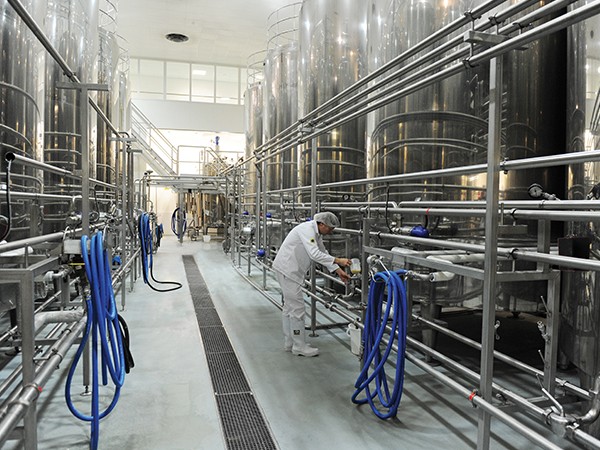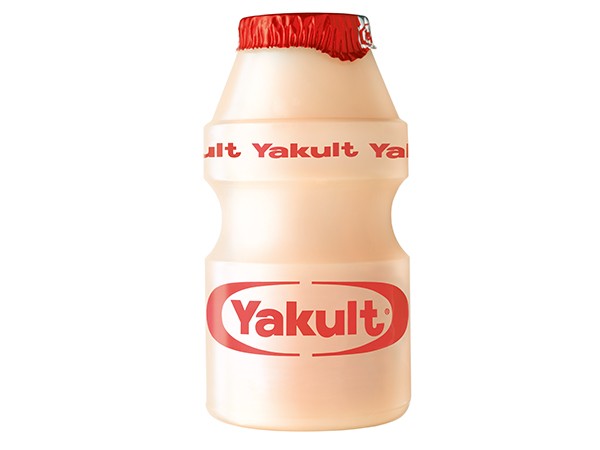
Worldwide, 40 million people drink the fermented dairy drink Yakult. The production process starts with a small tube of bacteria of our mother company from Japan. ‘Growing a minimum of 6.5 billion bacteria per bottle in the laboratory is the first challenge.’
The production for the European market takes place in Almere. Over a million bottles of Yakult flow from the plant every day. The basis is formed by the Lactobacillus casei Shirota bacteria which was discovered in 1930 by the Japanese scientist and founder Dr Minoru Shirota. What is special – and was also demonstrated by TNO – is that these bacteria reach the bowels alive. As soon as this special ingredient could be processed in a dairy drink, production started in Japan in 1935. Jan-Albert Blaauw, Corporate Affairs manager: ‘For over 80 years Yakult has carried out the same production process at all international locations, based on fermentation lasting about a week. We work continuously with living organisms, which is why monitoring is a highly important activity within our company’.
Bacteria are everywhere. In the air, on devices and also in food and in the body. Many types of bacteria are indispensable for man. For instance, bacteria are necessary or improving our food. Yakult had a pioneering role in the development of probiotics. Most bacteria in the human body live in the bowels. There, billions of good and bad bacteria are found. In total some 1,000 species constitute the bowel microbiota. It is important that the bowel flora stays in balance. If it is disturbed, physical problems will arise. Complaints may vary for each individual.

That Yakult chose Almere as its European production location 25 years ago, has to do with the required quality of the water. This ingredient has to be as pure as possible, must not contain chlorine and have the right mineral composition. ‘In Almere we use ground water which is pumped up in the Veluwe. This is well-filtered and very clean drinking water’, Blaauw emphasises. Other ingredients are, among others, sugar, glucose-fructose syrup and milk powder. Yakult uses milk powder because with it, the production process can be better steered, as opposed to fresh milk. Ingrid de Greeff, Manager QA&QC and Environment Issues: ‘We first request a sample and then research in our laboratory if the Shirota bacteria will grow on it. If the test is positive, we will order that specific batch. That way, we will be sure that every production process will be successful’.
The first phase of the production process concerns the mixing and dissolving of the basic ingredients skimmed-milk powder, water and glucose-fructose syrup. After sterilisation, the Lactobacillus casei Shirota bacteria is added. Next, the mixture is ready for the fermentation process which takes about a week – in large fermentation tanks. The temperature must remain as constant as possible. After this part of the process the milk solution is pumped through a homogenisator. ‘Under high pump pressure a more liquid homogenous product is created’, De Greef explains. The final production step is flavouring with aromas and glucose syrup, after which pure sterilised water is added. This entire process involves strict hygiene procedures and quality checks.
The test in which lab technicians check bacteria growth on the milk powder sample, takes seven days. De Greeff: ‘In fact, we exactly imitate our real production process on a small scale. When other bacteria enter our product we can intervene in our production process immediately’. Yakulkt also carries out taste flavour checks during the process, in addition to measuring the amounts of sugars. The right composition must be very exact. ‘The TA value is also an important criterium. If you measure the content of lactic acid, you can also calculate the amount of bacteria. A minimum of 6.5 billion per bottle is our standard.’ It is Yaklult’s policy to keep as much control in-house as possible. Not only are the bottles filled, capped, labelled, packaged and transported very quickly, The Almere location also produces the recyclable polystyrene bottles on site itself.
While most manufacturers saw their production decrease during the economic crisis, Yakult’s remained stable. ‘That is thanks to the relatively large group of loyal users of Yakult’, Blaauw declares. ‘We are really proud of our production location. We are therefore open to visitors, who can register through our website.’ Yakult offers constant quality thanks to perfected processes and checks. This way, they have reduced chance to a minimum.
Source: © Vakblad Voedingsindustrie 2019; Beeld: ©Yakult